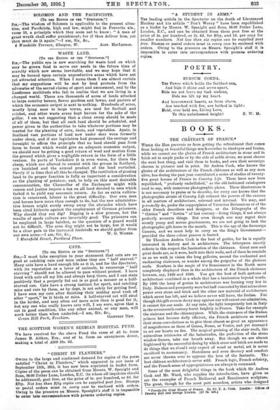WASTE LAND.
[To THE EDITOR OF THE " SPECTATOR.'] Sur,—The public eye is now searching for waste land on which may be grown food to serve our needs in the future time of scarcity which now seems inevitable, and we may hope that it may be turned upon certain unproductive areas which have not yet attracted attention. When I name them I am almost certain that my suggestions will be met by loud protests from the advocates of the sacred claims of sport and amusement, and by the Laodieean multitude who fail to realize that we are living in a changed world. There are thousands of acres of lands attached to large country houses, flower gardens and lawns, and pasture of which the economic output is next to nothing. Hundreds of acres, mostly lying near to large towns, are used for football and cricket, and other waste areas kept barren for the sake of the golfer. I am not suggesting that a clean sweep should be made of all of them, but that all such land should be scheduled, and power given to the authorities to take whatever portions may be wanted for the planting of corn, foots, and vegetables. Again, in Scotland vast portions of land now under deer were formerly under sheep, and if our legislators had possessed the courage and foresight to affirm the principle that no land should pass from farm to forest which would give an adequate economic output, we should now be getting a good return of wool and mutton from the ground which gives a negligible return in the form of a little venison. In parts of Yorkshire it is even worse, for there the sheep, which are allowed to coexist with the grouse in Scotland, are banished and the annual product of the land curtailed.
Surely it is time that all this be changed. The restitution of grazing land to its proper function is fully as important a consideration as the planting of potatoes; and, to help on this most desirable consummation, the Chancellor of the Exchequer might with reason and justice impose a tax on all land devoted to uses which forbid it to yield any economic return. As far as extra cultiva- tion is concerned, labour is the great difficulty. Our own men and horses have more than enough to do, but the new administra- tive broom might surely sweep away the obstacles which have been cited hitherto against the employment of German prisoners. Why should they not dig? Digging is a slow process, but the results of spade culture are invariably good. The prisoners can be employed in large batches, so the question of a guard would not be difficult. The area dug might not be large, but it would be a clear gain in the increased foodstuffs we should gather from 7 Mansfield Street, Portland Place.


























 Previous page
Previous page